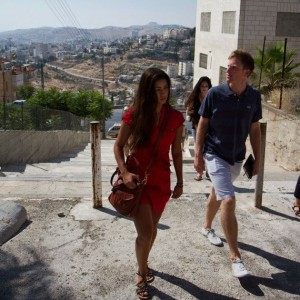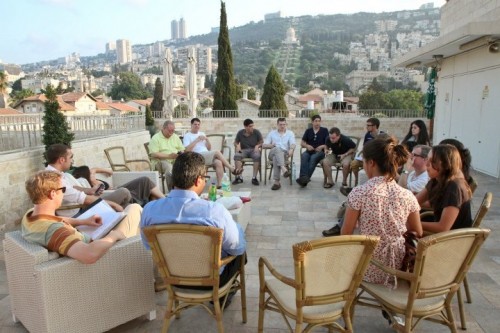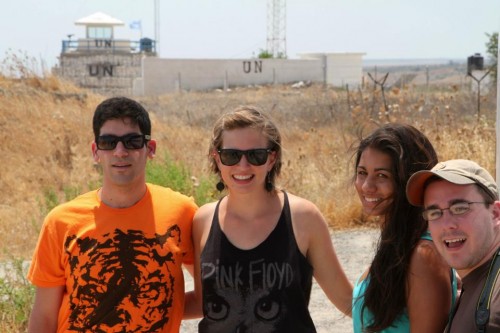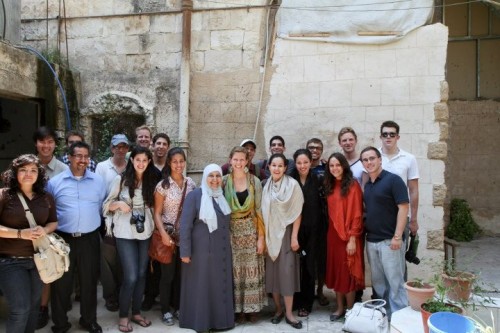This is a guest post by UC Berkeley Head Delegate Shannon Thomas. She blogged in-depth about her experiences at: http://oti5trip.wordpress.com/
On the Circuit, there are few issues that make headlines in MUN committees more frequently than the Israeli-Palestinian conflict. It is indeed a sexy topic, and one that is incredibly divisive, thus promoting engaging and hearty debate. Yet somehow, with almost flippant ease we manage to pass watered down or unrealistic resolutions on one of the longest lasting and most intractable conflicts in the world. More often than not, we do so caring more about the potential for awards than the pieces of paper to which we are signing on. Then we go about our day, our conference, our semester. But this summer, something changed for me. My summer in Israel and the West Bank changed my perspective on Model UN and my future.
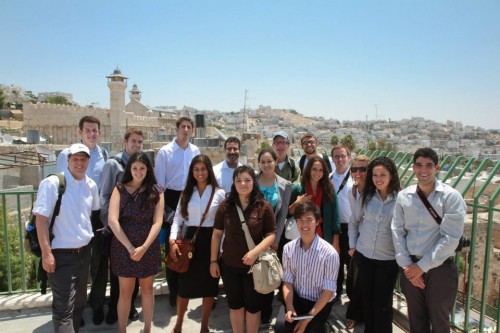
Berkeley Head Delegate Shannon Thomas and other students in the Olive Tree Initiative visited Israel and the West Bank
Some of you may know me through MUN as the Head Delegate for UC Berkeley, however outside of conferences I am also the President for the Olive Tree Initiative (OTI) on campus. OTI is an organization that brings an interfaith, culturally diverse group of students together in multi-perspective education on the Israeli-Palestinian conflict. Our year’s worth of events and meetings culminates in a three-week trip to DC, Israel, and the West Bank, meeting with some of the top politicians, negotiators, NGOs, and civil society leaders in the field. While there, we were constantly crossing physical and intellectual boundaries, seeing places and people I have only ever read about in my text books. We met with with Prime Minister Netanyahu’s lead spokesperson, Mark Regev, at the Knesset and then with Hanan Ashrawi, the top Palestinian negotiator and executive at the PLO Headquarters in Ramallah. We traveled to the segregated city of Hebron, stepping foot on both sides of the dividing wall running through one of the holiest sites in Judaism and Islam, the Tomb of the Patriarchs/Ibrahimi mosque. We spoke with Palestinian refugees in Aida Camp and settlers in Ariel. We toured the separation barrier/wall/security fence between Israel and the West Bank with its architect, Danny Tirza, and then with human rights groups B’Tselem. And through all this, I underwent one of the most intensely emotional and transformative experiences in my life.
For meanwhile, as I listened to the most brilliant minds and experts in the conflict, with their eloquent articulation and canned political lines, I could not help but remember two parents. During the middle of our trip, we traveled to Jenin Refugee Camp where we sat down with a woman’s cooperative and I met the Mother of Emad. This woman lost her son, a journalist for Palestinian and Israeli newspapers, a student about to depart for college in England, and a photographer who was shot and killed by an IDF tank for taking pictures of a protest. The next day, we departed for Haifa, congregating in a cemetery for terror victims and speaking to a father who’s 17 year old daughter, Tal, was murdered in a suicide attack. Both these senseless deaths occurred during the Second Intifada, and both parents were left in the wake of the destruction, trying to hold together the shattered pieces of their lives. Emad’s mother told us to call her our mother, and Tal’s father bore striking resemblance to my own father. And after meeting these two beautiful and broken people, I realized that more than anything else, this is a human issue. The political maneuvering, the selfish hubris of leaders, and vitriolic rhetoric all detract from what really matters – the people who are forced to live through this conflict every day. These issues that we so often reduce down to their basic intellectual properties, to clauses in a resolution, actually determine the lives and deaths of real people.
I would ask that all of us, as students in Model UN try to remember that. Because while we are having fun, gavel-grubbing, and sending candy grams to the cute Vice Chair, there is real suffering in the world and real ramifications for our actions. All clichés aside, we are the future of political and international leadership, and we better start acting like it. While I sat with the UN Office for Coordination of Humanitarian Affairs or stood under the UN Flag at the Observer Mission on the Syrian border, I realized that what we do is not just make believe – it is what I want to do in the future. We get the chance to practice making a better world, and one day we will be expected to put that practice into action. So whether the topic of debate is Israel-Palestine, droughts in the Horn of Africa, the world financial crisis, or anything else, we need be cognizant of the fact that there is more at stake than awards. Whether in Jerusalem or a conference hotel room, we have real responsibility and real potential to make a difference.

